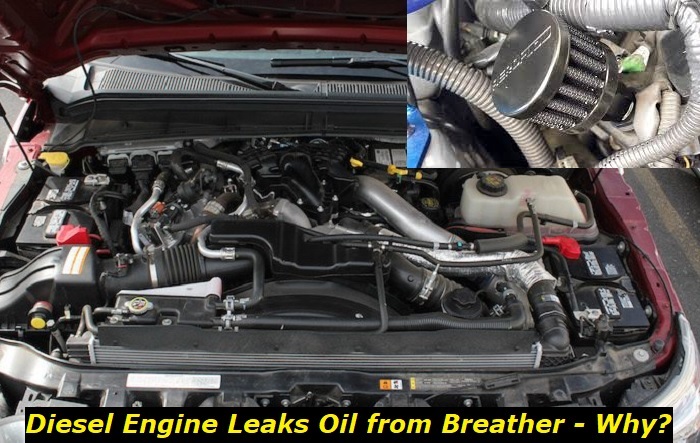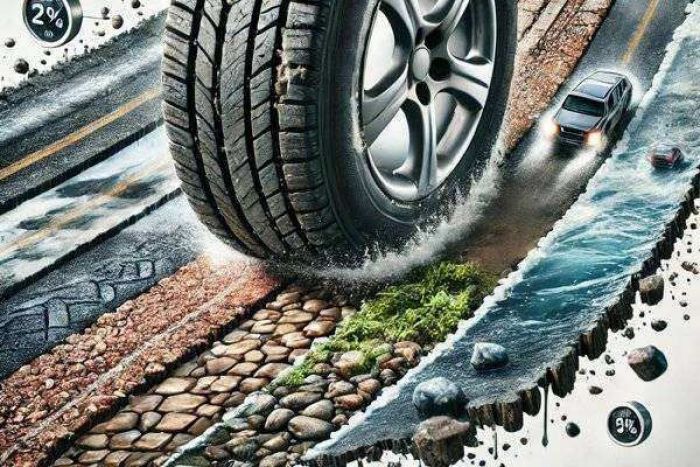When you see that the diesel engine is leaking oil from the breather, you may suspect a PCV valve, piston rings, integrity of the engine block, or too high oil level. This is not the full list of possible issues, but these four reasons will cause the breather to leak oil in most cases.
Oil leaks highlights
- Level of urgency:medium
- Average mileage:over 50,000 miles
- Repair cost:$200 - $1,800
- DIY repair:only in some cases
- Commonreasons:head gasket, other gaskets, seals, fasteners
- If ignored:low engine oil level, contamination of units under the hood, engine damage
- How to solve:locate the leak and repair the system that is leaking

Learning what a breather and crankcase are in a diesel engine
Your engine has a crankcase. This is the central part of the engine that basically holds all the important equipment in the engine block. This is the part where pistons move through cylinders. So, this is part of the cylinder block.
When your pistons move in a new engine, all the pressure that they create is sent to the combustion chamber while the crankcase shouldn't get any pressure. This is the work of one set of piston rings called compression rings. The other set of rings (called oil rings) is used to keep the oil in the crankcase and prevent it from moving to the combustion chamber.
OK, let's try to use less of those technical explanations. So, your crankcase is a limited space where pistons move and if it gets some extra pressure inside, it will experience problems and the engine will find it harder to work. To solve this problem, engineers came up with crankcase breathers.
So, the breather does the following:
- it ensures that there is a way to release the pressure in the crankcase if it builds up somehow;
- it ensures that even when the engine is not new and has some problems with piston rings, it can still work;
- it allows the crankcase to work properly and not disturb the work of the entire engine;
- it sends any air that comes into the crankcase out of it;
- it works to balance the natural pressure in the crankcase and let it actually breathe when needed.
The breather is actually a hole in the cylinder block with a pipe connected to it. In some cars, this pipe may be connected to the fuel injection system (in older carbureted engines) but in most engines, it will just be releasing air into the engine bay through some sort of filter.
In the majority of modern engines, you will find the PCV system. The Positive Crankcase Ventilation system allows the air and gas that somehow got into the crankcase to go back to the intake manifold and burn.
Very often, owners of diesel cars and trucks notice that their breather system leaks oil. Let's see why and how this may happen.
Symptoms of your breather leaking oil
If your breather is just a pipe with a filter that blows air into the engine bay, it's not that hard to see the oil leaking from it. But if your engine has the PCV system, it will leak oil into the intake manifold.
Some of the most common symptoms of this are the black smoke from the tailpipe, bad buildup on spark plugs, injectors, and valves, dropping oil levels, etc. So, your engine will just burn oil and you will try to figure out why until some experienced mechanic will tell you that it's the breather system that should be in charge.
If you find out that the PCV is leaking oil or your breather pours oil directly into the engine bay, you should find out why this happens as soon as possible.
The reasons why diesel engine breather leaks some oil
I decided to talk to engine mechanics and experienced truck owners to find the answer to this question. And here's what I could find:
1. Too high oil level
If the oil level in your diesel engine is too high, the oil will create extensive pressure in the crankcase with every move of each piston. It means that some oil will be pressed to go through the breather and will eventually leak because the breather is the easiest way for this pressurized oil to escape from the crankcase.
Also, this will affect the smoothness of the engine work and will limit its power a little.
2. Bad or diluted oil
If your coolant leaks into the oil and dilutes it, it will form a kind of solution that easily foams and changes its volume. When this happens, the white foamy oil will start searching for a way to escape from the closed crankcase. One of the most natural ways to do that is to use the breather and the PCV system to get directly into the combustion chamber and then burn.
This will quickly cause fatal engine problems and the diluted oil with changed properties will not lubricate the engine.
But coolant leaking into the oil is not the only possible reason. The oil may be old or just may not be appropriate for this engine.
3. Worn-out piston rings
Now, I'm talking about compression rings that are aimed to keep the pressure in the upper part of the engine rather than letting air leak into the crankcase. If those rings fail, the engine will lose its power and will work harshly, and the extensive pressure in the crankcase will eventually push the engine oil out through the breather.
Checking piston rings is not that easy - for this, you will need to take apart the entire engine block and this is probably the last thing you want to do in any diesel engine.
4. PCV valve clogged
PCV valve opens when the pressure in the crankcase is high and the engine needs to release it sending some crankcase gases to the intake manifold. But if the valve is broken or clogged, the pressure will keep building up and eventually, there will be some outer leak in the breather system. Some pipes or connections may start leaking because of extensive pressure.
5. Just high crankcase pressure
This may be the result of a completely worn-out engine. If your diesel engine already has over 300,000 miles on it, it may require overhauling or replacement. Broken gaskets, seals, rings, cracked block, cracked piston, and many other things may cause the buildup of crankcase pressure in your engine.
It means that the pressure will always push oil through the breather and you will have to deal with the problem because the engine will eventually die.
Can you drive when you notice oil leaking from the breather?
Yes, you can still drive the engine if there is no extensive black smoke from the pipe. Small leaks are not fatal and you can still run the engine for several hours until you get to the repair shop or dealership to have the engine inspected properly. But if you notice that the oil leak is huge, the best thing is to stop the engine and find the problem before you start it again.
Extensive leaks that started suddenly usually tell you about a very serious problem. If you keep driving your engine this way, it may push out almost all oil from the engine block and will eventually destroy itself because of poor lubrication. Also, the burning oil will clog the head, valves, and also DPF adding even more problems.
So, yes, you can drive, but only in the case when the leak is not serious and you want to drive the vehicle to the repair shop without calling a tow truck for help.
How can you repair the diesel engine after an oil leak from the breather?
I would start with a thorough inspection. Finding the problem that causes your engine to leak oil from the breather is not that easy, so it may take some time even in a professional shop.
At first, I would check obvious things such as clogged PCV valve, clogged pipes of the breather, bad filters in the breather, etc. Then, I would also check the oil level and the properties of the oil - if they are changes, you should look for other internal leaks.
After that, I would also check the airflow from the breather pipe when the engine is working. If it's too strong, then the problem may be with the engine block, gaskets, or piston rings.
If you can't locate the problem easily, then it's hard to move on without taking apart the entire engine and checking the block's integrity, the pistons, and the piston rings. Without this, you will not be able to repair the engine and bring it back to life.
But sometimes, it's easier to replace the engine if the problem is in a cracked block or piston. Especially, if the engine has very high mileage and is old. In this case, it will need too much investment to repair all the problems that have already started developing.
About the authors
The CarAraC research team is composed of seasoned auto mechanics and automotive industry professionals, including individuals with advanced degrees and certifications in their field. Our team members boast prestigious credentials, reflecting their extensive knowledge and skills. These qualifications include: IMI: Institute of the Motor Industry, ASE-Certified Master Automobile Technicians; Coventry University, Graduate of MA in Automotive Journalism; Politecnico di Torino, Italy, MS Automotive Engineering; Ss. Cyril and Methodius University in Skopje, Mechanical University in Skopje; TOC Automotive College; DHA Suffa University, Department of Mechanical Engineering






Add comment